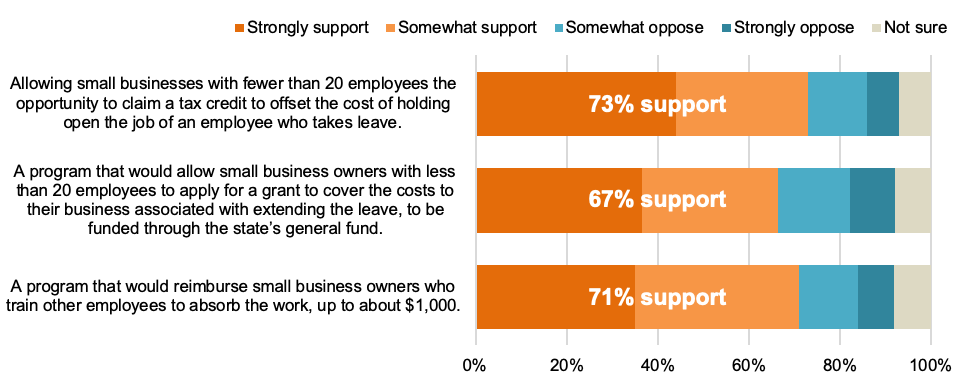California small business owners support expanding state’s paid family and medical leave program
For more than a decade, California’s Paid Family Leave Program (PFL) has helped level the playing field for small businesses that struggle to offer robust benefits by ensuring their employees have access to partial wage replacement when they need to care for a new child or a seriously ill family member. Now, Governor Newsom and state policymakers are discussing options to further expand the program and ensure more Californians are able to utilize it by increasing wage replacement, extending the amount of leave time available and expanding job protection status for parental leave. As with any discussion of workplace benefits and employment laws, the impact to small business is central to this debate. New scientific opinion polling sheds light on their views on the different proposals and reveals they are in fact supportive of numerous options on the table.
The poll was a survey of 350 California small business owners conducted by Chesapeake Beach Consulting for Small Business Majority with 2 to 99 employees between October 28 and November 6, 2019. Respondents were asked about an array of proposals to expand access to paid leave in California, and the survey reveals that small employers support increasing both the amount of leave available to employees to bond with a new baby, and the amount of wage replacement available to employees. Starting this year, employees are now eligible to take up to eight weeks of paid leave to bond with a new child. Sixty-one percent of small business owners support extending this leave to nine weeks, with nearly 1 in 3 respondents (32%) strongly supporting this proposal.
Figure 1: California small employers support increasing the amount of leave available to employees to bond with a new baby to nine weeks

Additionally, the survey finds that a majority support increasing wage replacement through PFL for low-wage workers. Under current California law, workers who take parental leave are eligible to receive up to 70% of their wages. More than 6 in 10 (61%) small business owners say they support a proposal to increase the wage replacement amount to 90% for low-wage employees (anyone earning about $45,000 annually) and 75% for everyone else.
Currently under state law, businesses with 20 or more employees must protect the job of an employee who takes leave to bond with a new child. Nearly 6 in 10 small business owners (59%) in California support expanding this to require all businesses with one or more employees to offer job-protected parental leave to employees. This proposal also found strong support among the smallest businesses: 57% of small business owners with 2-5 employees support expanding job protection to all businesses with at least one employee. Small business owners were also asked about expanding job protection to businesses with 15 or more employees, and 64% say they support this proposal.
Figure 2: Small business owners support expanding job protection to all employers in California, regardless of size

State policymakers are considering a number of proposals to offset the burden on small businesses if job protection is expanded to include the smallest employers and the length of leave time is extended. Survey results reveal the following proposals are strongly supported by employers:
Figure 3: Small employers strongly support proposals to help business owners whose employees take leave

California small business owners are addressing their employees’ need to take extended family or medical leave on a day-to-day basis, and as this survey reveals, they are broadly supportive of ensuring those workers are better positioned to participate in the state’s paid leave program by expanding it and ensuring more employees are eligible for the program. As state policymakers consider ways to ensure more Californians are utilizing PFL, it’s essential that small businesses are part of these conversations.
